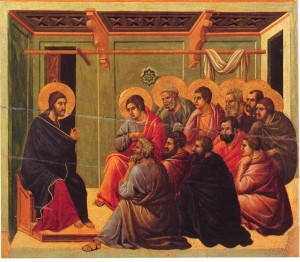In my previous post, I talked about the revolutionary vision of philosopher Jamie Smith. I wanted to briefly follow up with some thoughts that capture some of the more provocative points in this book.
One of Smith’s main points in the book is that we are by nature liturgical creatures. For some of you, the word liturgy may throw you a curveball; you may think the term simply means heartless repetition that fosters in-authenticity. But that’s not what he means. (And that’s actually not the design of liturgy at all, but that’s for another blog.)
What Smith means is that there are habits in life that form and foster our desires. Not every virtuous act is the product of conscience spontaneity, but is often the result of habitual practice.
As I was reading Smith, I couldn’t help but think of my former life as a baseball player. I used to train my “muscle memory” to hit a fastball. It takes .6 seconds for a 90mph fastball to go from the picture’s hand to the plate, so there’s no time to think, analyze, and swing. You just gotta swing! Parking a fastball over the fence is largely a product of muscle memory. It’s the byproduct of habits formed through practice.
This is not too different from holiness. As the “spiritual disciplines” movement has shown, holiness comes through integrating necessary habits into the fabric of daily life. What Smith’s project adds to Willard, Foster, and other “spiritual disciplines” gurus is a necessary ecclesial emphasis.
It is the liturgies of the church that form and reform in our minds and hearts who we are in Christ. We are the redeemed (baptism) and forgiven who long for Christ’s return (Eucharist). We are the generous (offering), the needy (confession), and we cannot live on bread alone but on the word of God (sermon, homily). And we rejoice in our sufferings and testify to the goodness of God in creation (worship, singing).
Here’s a rather lengthy quote from Smith that teases this out:
Our habits…constitute the fulcrum of our desire: they are the hinge that “turns” our heart, our love, such that it is predisposed to be aimed in certain directions…We don’t wake up each day thinking about a vision of the good life and then consciously, reflectively make discrete decisions about “what we’ll do today” as penultimate means to our ultimate ends…Instead…our desires for the kingdom is inscribed in our dispositions and habits and functions quite apart from our conscious reflection” (DK, 56).
Again:
These habits constitute a kind of “second nature”: while they are learned…they can become so intricately woven into the fiber of our being that they function as if they were natural or biological. They represent our default tendencies and our quasi-automatic dispositions to act in certain ways, to pursue certain goods, to value certain things, to cherish certain relationship (DK, 56).
There are certainly some things I’d qualify or question, but much of what Smith says I agree with. (The stuff I question is addressed throughout his book.) Either way, there’s much to consider—especially for churches where liturgy gets a bad rap.















